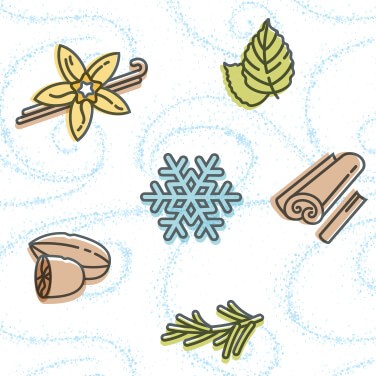Scents of the Season from a Scientific Perspective
By Kylie Wolfe
With the holiday season in full swing, you may find yourself recalling fond memories or feeling a change in mood. If you associate certain scents with specific thoughts or emotions, there’s a scientific explanation for your experience.
Down to a Science
Our five major senses have their own unique sensory pathways, relaying valuable information to our brain about the world around us. But one of these senses has a more unique route than the rest.
When we breathe in, scent molecules travel and dissolve in the mucous lining of our olfactory epithelium. Here, olfactory receptors sense the signal, pass it along to the olfactory bulb and then to the olfactory cortex, an area of the cerebral cortex that helps process different scents.
What makes this sensory path unique is its connection to the limbic system, particularly to the amygdala and hippocampus, which are associated with emotion and memory, respectively. Because of this link, scientists have been able to observe how specific scents bring emotions and memories to the forefront, impacting mood. In the spirit of the holidays, here are five popular scents that may produce some psychological benefits.
Chocolate
A study published in The Journal of Experimental Psychology: Learning, Memory and Cognition notes that students who were exposed to the smell of chocolate during a word exercise recalled 21% of the words the next day, while those not exposed recalled only 17%. This indicates that scents can help bring back associated memories, so if you’re looking to help yourself remember things from year to year, like a family-favorite recipe or a holiday story, the smell of chocolate might do the trick. Researcher Frank Schab said, ''People seem to believe from their own experiences that odors are special, in the sense that they can recall very vividly events from 20, 30 years ago.”
Peppermint and Cinnamon
Maybe you’re trying to power through your last few batches of cookies or stay alert on your drive out of town. If that’s the case, the aromas of peppermint and cinnamon can help boost brain power and improve your concentration. A study conducted at Wheeling Jesuit University monitored participants behind the wheel, adding either the smell of peppermint, cinnamon or no odor at all to their cars. The results showed that these scents decrease levels of frustration and increase alertness, which may make a long drive a little safer and more enjoyable.
Pine
The smell of pine on a stroll through the forest or a nearby tree farm this time of year can also be good for your health, especially when the stress of shopping for presents or preparing to host a meal for family and friends becomes overwhelming. This method of de-stressing, known as shinrin-yoku, or forest therapy, is a popular practice in Japan. Researchers at Kyoto University surveyed 498 participants both before and after they entered the Tokyo University Forest and found that hostility and depression decreased, while liveliness increased. They noted that the higher a person’s stress level, the greater the benefits of this practice.
Vanilla
Another popular scent this season, vanilla, can trigger happiness and an overall improved mood. In a study comparing the effects of citrus and vanilla, researchers used Mood Mapping™ technology to measure feelings associated with these aromas. They found citrus to be more stimulating and vanilla very relaxing, so the latter might be the answer to helping you settle in for the evening after a long day out.
Conclusion
Our relationship with our sense of smell is biologically and chemically rooted, giving these experiences a scientific explanation. The aforementioned scents are closely intertwined with a number of holiday foods and traditions, which over time can make it easy to link them with specific emotions and memories from years prior.
